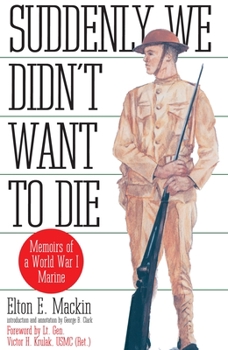Suddenly We Didn't Want to Die: Memoirs of a World War I Marine
Select Format
Select Condition 
Book Overview
In the tradition of All Quiet on the Western Front, Elton E. Mackin's memoirs are a haunting portrayal of war as seen through the eyes of a highly decorated Marine who fought in every Marine Brigade battle from Belleau Wood to the crossing of the Meuse on the eve of the Armistice. Praise for Suddenly We Didn't Want to Die "This beautifully written and truly gripping war memoir is a significant addition to battlefield literature. A minor classic ...
Format:Paperback
Language:English
ISBN:0891415939
ISBN13:9780891415930
Release Date:November 1996
Publisher:Random House Publishing Group
Length:272 Pages
Weight:0.60 lbs.
Dimensions:0.8" x 5.6" x 8.5"
Customer Reviews
5 ratings
My Favorite WWI book
Published by Thriftbooks.com User , 16 years ago
My first WWI book. I was fascinated at what they went through, above and beyond the physical discomfort of any other war since. The Marine aggressiveness was there in WWI just like every other war. My favorite WWI memoir.
A poetic and pungent battlefield memoir
Published by Thriftbooks.com User , 19 years ago
"Suddenly We Didn't Want to Die: Memoirs of a World War I Marine," by Elton E. Mackin, has an introduction and annotations by George B. Clark and a foreword by Lieutenant General Victor H. Krulak, USMC (Ret.). Clark's introduction notes that Mackin was born in New York State in 1898 and enlisted in the Marine Corps in 1917. This book evokes the combat experiences of Marines in Europe during WW1. I found this book quite stunning. The sections often read like prose poems or very short stories. Mackin is graphic in describing wartime violence and suffering, but his writing is also at times quite beautiful. The narrative opens with the Marines preparing to advance upon German-held Belleau Wood. Mackin follows in particular the career of "Slim," a Marine who becomes a runner (battlefield messenger). Mackin covers a number of subjects: encounters with German troops, relations with civilians, relations between "old-timers" and green replacement troops, and the dangers of the runners' job. The book contains many interesting technical details about war in that era: weapons, fortifications, poison gas, etc. The narrator's voice is often ironic, satiric, sarcastic, and even bitter. But his voice is also humane--he sees moments of kindness and tenderness in the midst of the hell of war. At one point the author cites Walt Whitman. Like Whitman, Mackin is irreverent yet compassionate, with an eye for detail and a knack for rendering humanity in both its tragedy and beauty. This is a valuable addition to the canon of United States war literature.
Vietnam was nothing new
Published by Thriftbooks.com User , 23 years ago
Mackin's book is a spare, at times profound and almost poetic evocation of the life of a Marine Corps grunt on the Western Front in World War I. The dominant theme is of how men accommodate themselves to the appalling realization that they are in a hopeless situation in which they will be killed, and there is nothing they can do to prevent it, and that no one other than their comrades will ever fully appreciate this predicament: "The folks at home will never know the truth."Mackin writes of the thrill and terror of battle, the feelings of fear and elation, and the awe at seeing other men die: "It is always a show, no matter how terrifying."To deal with this world of fear and death, men developed a sarcasm for weakness: "They make a bitter joke of things to cover feelings"; "We learned to close our minds to the memory of men who fell. We took the way of living day to day . . . We learned to laugh at everything in time. It carried us." Men lost their youth, and in some ways matured, and in other ways were permanently scarred: "There was no singing now . . . The faces had changed. . . . his scars would be deep, and never, never leave his eyes."
A vivid and eloquent book
Published by Thriftbooks.com User , 25 years ago
Elton E. Mackin only had a high-school education but he wrote with a natural ability. Here is war. He dosen't glamorize it, he dosen't attempt to glorify it and he dosen't use his memoir as a soapbox. He dosen't judge or condem those who were in command. This is an account of a rifleman. He served at the very bottom and experience war at it's most basic and cruel. Next to the fear and horror of combat Mackin gives equal time to the everyday exsistence of a soldier or Marine. The lack of sleep, the poor food which there was never enough of, the boredom, all the physical discomforts of serving in the field during a war. A superb book. Of interest to both WW1 buffs and the general reader.
67th Company, 1st Bn, 5th Marine Regiment, 2nd Division.
Published by Thriftbooks.com User , 27 years ago
The American combat experience in World War I, brief and now out of living memory, mostly lacks the literary exposure of the British Great War writers, and produced nothing like the avalanche of memoirs of World War II. This has been something of an historical injustice to the "doughboy" , the American "grunt" of World War I. Dirty, hungry, poorly equipped and supplied, suffering as much from the elements as the enemy, the American civilian-soldier persevered, fought, and won, rather to the surprise of Allies and enemy alike. Mackin, recipient of the Distinguished Service Cross, Navy Cross, and two Silver Stars, tells the story well, in a compelling narrative which will stand with Sledge's "With the Old Breed" as monuments to the American soldier in general, and the American Marine in particular. (The numerical rating above is an ineradicable feature of the page. This reviewer does nor employ numerical ratings.)






